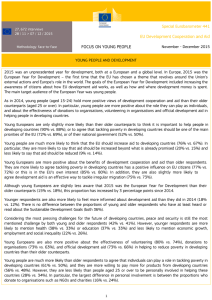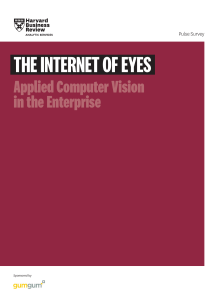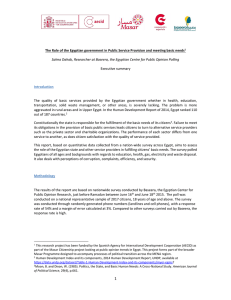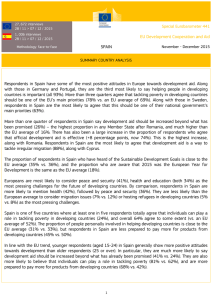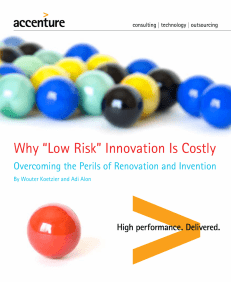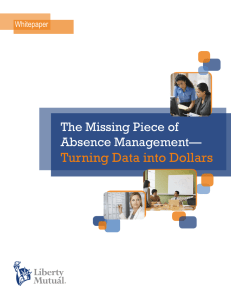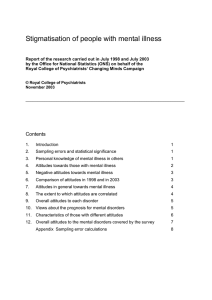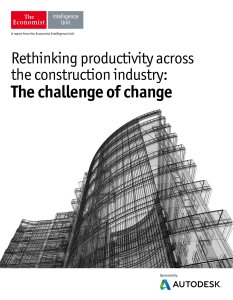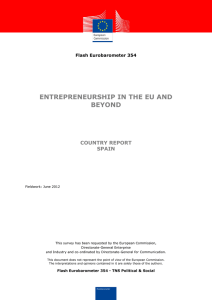report
Anuncio
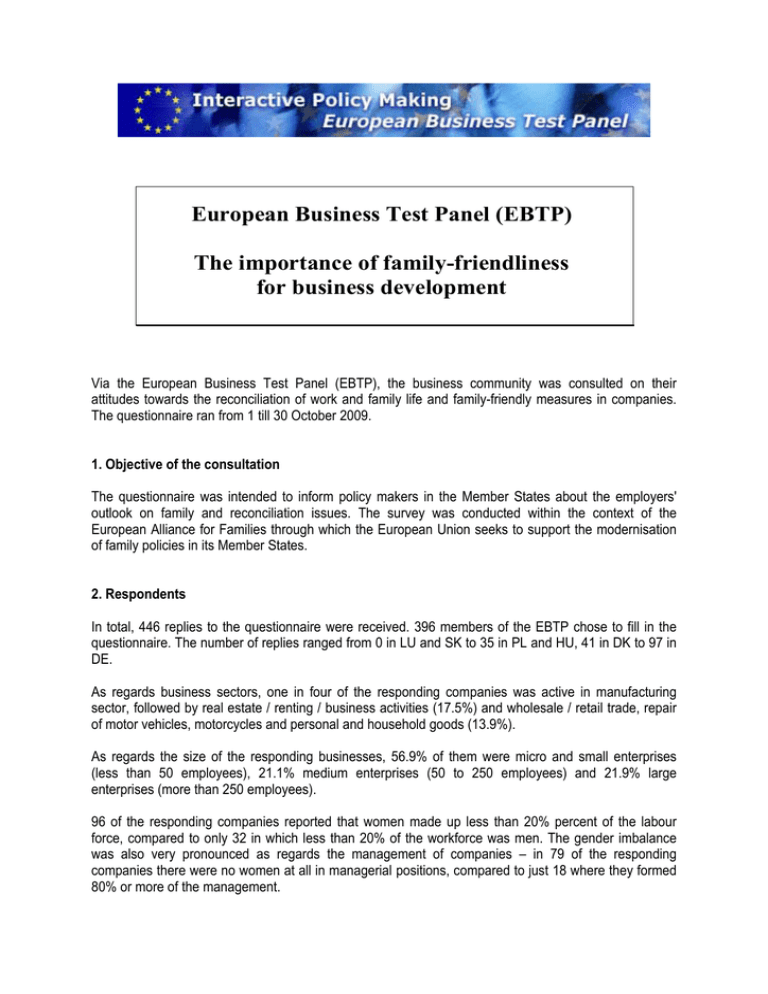
European Business Test Panel (EBTP) The importance of family-friendliness for business development Via the European Business Test Panel (EBTP), the business community was consulted on their attitudes towards the reconciliation of work and family life and family-friendly measures in companies. The questionnaire ran from 1 till 30 October 2009. 1. Objective of the consultation The questionnaire was intended to inform policy makers in the Member States about the employers' outlook on family and reconciliation issues. The survey was conducted within the context of the European Alliance for Families through which the European Union seeks to support the modernisation of family policies in its Member States. 2. Respondents In total, 446 replies to the questionnaire were received. 396 members of the EBTP chose to fill in the questionnaire. The number of replies ranged from 0 in LU and SK to 35 in PL and HU, 41 in DK to 97 in DE. As regards business sectors, one in four of the responding companies was active in manufacturing sector, followed by real estate / renting / business activities (17.5%) and wholesale / retail trade, repair of motor vehicles, motorcycles and personal and household goods (13.9%). As regards the size of the responding businesses, 56.9% of them were micro and small enterprises (less than 50 employees), 21.1% medium enterprises (50 to 250 employees) and 21.9% large enterprises (more than 250 employees). 96 of the responding companies reported that women made up less than 20% percent of the labour force, compared to only 32 in which less than 20% of the workforce was men. The gender imbalance was also very pronounced as regards the management of companies – in 79 of the responding companies there were no women at all in managerial positions, compared to just 18 where they formed 80% or more of the management. 3. Analysis of replies The respondents were asked, when replying to the questionnaire, to look beyond the current economic crisis and assume that the economy have returned to a normal development path. The focus was to be put on structural demographic and social challenges having an impact on their personnel policy and demand for products. 3.1. Challenges and expectations regarding human resources Asked to assess the perspectives of recruiting and retaining staff within the next five years, the respondents reported that recruitment of skilled employees will pose a significant challenge (55.6% indicating "fairly difficult" or "very difficult"). Retaining skilled employees is expected to be slightly less problematic (47.2% indicating "fairly difficult" or "very difficult"), whereas recruiting and retaining unskilled employees is not a matter of concern (respectively 14.4% and 12.6% respondents expect difficulties). The above results indicate a significant difference in terms of incentives for employeefriendly actions, including solutions aimed at facilitating reconciliation of work and family life: companies with a higher share of skilled staff should be more likely to implement such measures. 3.2 Positive and negative impacts of employees' private lives on companies The most obvious impacts of employees' private lives on their performance and, in consequence, on the company's operation (e.g. need to replace women employees who are on maternity leave), were perceived as moderately challenging. A general category of employees "performing less well than possible due to family-related stress" (e.g. divorce) was indicated as posing more the greatest problem. The respondents were asked in an open question whether the private lives of their employees, men as well as women, had any other negative or positive impacts on their company. They reported that in general a happy family life contributed to the employees' ability to relax and, in consequence, raised their productivity. Moreover, parents were considered as "more responsible, better motivated and more resilient". On the other hand, leaves of absence to care for sick children were often mentioned as a major problem, especially by small companies. In addition, people with families are, according to respondents, less flexible. Their family responsibilities have sometimes indirect impacts on other employees (“People with families can never deploy at short notice, therefore it's always the single people who have the more difficult conditions.”) 3.3 Perception of family-friendliness For almost half of the respondents (47.2%), being perceived as a family-friendly employer was "somewhat important". 26.5% perceived it as "very important", whereas 20.1% considered it as "not very important" and 6.1% as "not important at all". Asked about their motives to implement family-friendly measures, a clear majority (58%) quoted retaining staff as the single most important reason. This was followed by the creation of a positive image among the public (17.3%). Attracting new employees was only seldom indicated (6.3%). 2 As regards the effects of being a family-friendly employer, 60.3% of respondents said that it helped to create a positive image of the company and to demonstrate its social responsibility. More than half of the respondents agree that family-friendliness contributes to a reduction of absenteeism, to attracting the best qualified staff and to improving productivity. Just fewer than 40% are of the opinion that it might lead to increased profits. 3.4 Policy preferences The existing family-related leaves (i.e. maternity, paternity and parental) vary a lot between the Member States, but they were considered as satisfactory by a clear majority of respondents in most countries. The most significant exceptions were UK were the majority (17 out of 28) supported shortening of the unpaid parental leave and Poland where the majority (17 out of 32) opted for extension of the maternity leave. Among the possible measures that can be taken by public authorities to help families, long opening hours of schools and childcare facilities received most support among respondents (72.2% supporting progress in this regard), followed by public childcare facilities at no or low cost (64.4%) and financial support for families using private childcare arrangements (55.3%). Out of all listed measures, expansion of universal child benefits received the least support (38.6%). 4. Conclusions Given the nature of the survey (a small and self-recruited sample with an imbalanced distribution across the Member States), the results described above need to interpreted with great caution. However, some general remarks can be made. The reconciliation of work and family life remains a challenge for many Europeans. Seen from the employers' perspective, the situation is most difficult in small companies, where a family-related absence of a just one employee might have an important impact on the entire enterprise. Creating good conditions for employees who want to reconcile their work and family life is, according to many entrepreneurs, an efficient way of retaining staff. However, it should be stressed that keeping the existing workforce is believed to be important for company's operation only as far as it concerns skilled employees. In addition, for many respondents family-friendliness seemed to be mostly an image issue. Last but not least, with the exception of an extension of school and childcare hours, no great changes in the area of reconciliation and family-related policies were expected or desired by a majority of respondents. The existing arrangements (e.g. maternity and parental leaves) are considered as satisfactory. 3
